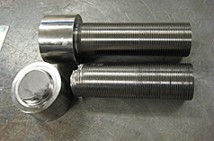An article entitled “Verifying Quality and Reliability with Fastener Testing” by an LTI associate was published in the January/February 2016 edition of American Fastener Journal magazine. The article discusses the importance of testing both the raw materials used to manufacture industrial fasteners and the finished fasteners themselves, in order to ensure their safety and reliability. A wide range of test methods and the information obtained from the tests are presented.
Value of Raw Material and Finished Fastener Testing
 Most industrial fasteners are covered by standards for materials, dimensions and tolerances. These standards stipulate the types of tests to be completed, which can be either destructive and/or non-destructive testing, and are available to perform the following:
Most industrial fasteners are covered by standards for materials, dimensions and tolerances. These standards stipulate the types of tests to be completed, which can be either destructive and/or non-destructive testing, and are available to perform the following:
- assess material composition
- evaluate mechanical properties and corrosion resistance
- verify feature dimensions
- identify flaws or discontinuities
In the article, the author writes about the most common types of fastener testing and how these services are used throughout the product life cycle by fastener manufacturers on through to the end user. Fastener testing helps ensure the dependability of fasteners, especially those that will be subjected to extreme wear, but can also be crucial in meeting supply chain requirements or resolving customer complaints. They can play an important role in selecting materials and evaluating production processes, as well as performing regular quality control checks on finished fasteners and researching problems.
Full Capabilities to Support the Fastener Industry
Laboratory Testing is an independent materials testing lab specializing in destructive and nondestructive testing services. The Lab offers full-service capabilities for testing metals, but also provides some services for polymers. LTI’s engineers, chemists and technicians perform fastener testing according to a broad range of ASTM, SAE, ISO and NASM standards. Test results are documented in Certified Test Reports, which are oftentimes needed to meet quality requirements.
Learn more about the fastener testing services at LTI or ask us to quote your next order.
Related Articles
Introduction to the ASTM E606 Standard
Low-Cycle Fatigue Testing and the Standards Set Forth by ASTM In the world of engineering, materials are often subjected to…
The Top 5 Consequences of Industrial Operations Not Calibrating Their Equipment
In the fast-paced world of industrial operations, precision is not just a goal—it’s a necessity. Calibration of equipment, a process…
The Benefits of Choosing a Calibration Company that Offers Instrument Replacement and Purchasing Services
In the demanding world of industrial manufacturing and quality assurance, selecting the right calibration partner can significantly impact your operational…
How Small a Defect Can UT Find
Customers often ask LTI how small a defect ultrasonic testing (UT) can find. This question is very difficult to answer…
Ethics in Laboratory Testing
What could be more important than ethics in the world of materials testing? Testing laboratories have an obligation to adhere…
Quality Considerations in Chemical Analysis
A Well-Planned and Managed Quality Control Program When you need chemical analysis services, you expect to receive accurate testing and…